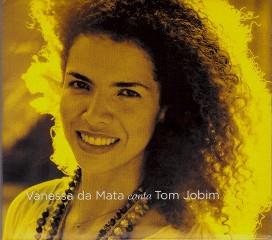Vanessa Da Mata – Vanessa da Mata Canta Tom Jobim (2013)
Vanessa Da Mata – Vanessa da Mata Canta Tom Jobim (2013)

1 Caminhos Cruzados 2:59 2 Fotografia 2:29 3 Só Danço Samba 2:29 4 Este Seu Olhar 2:51 5 Chovendo Na Roseira 3:22 6 Por Causa De Você 3:05 7 Eu Sei Que Vou Te Amar 2:48 8 Desafinado 2:57 9 Sabiá 3:41 10 Dindi 3:21 11 Wave 2:54 12 Só Tinha De Ser Com Você 3:53 13 Falando De Amor 3:36 14 Samba De Uma Nota Só 2:15 15 Correnteza 3:03 16 Estrada Do Sol 2:54 Acoustic Bass – Alberto Continentino Arranged By, Conductor, Piano – Eumir Deodato Bass – Kassin (tracks: 14) Cello – Gretel Paganini (tracks: 1 to 7, 8 to 11, 13 to 15), Marcus Ribeiro (tracks: 1 to 7, 8 to 11, 13 to 15) Drums – Stephane San Juan Guitar – Gustavo Ruiz, Kassin (tracks: 8) Guitar, Acoustic Guitar – Guilherme Monteiro Keyboards, Piano – Danilo Andrade Programmed By – Kassin (tracks: 3, 4, 6, 15) Synthesizer, Programmed By – Dustan Gallas Viola – Déborah Cheyne (tracks: 1 to 7, 8 to 11, 13 to 15), Rubia Siqueira (tracks: 1 to 7, 8 to 11, 13 to 15) Violin – Ana de Oliveira (tracks: 1 to 7, 8 to 11, 13 to 15), Denise Pedrassoli (tracks: 1 to 7, 8 to 11, 13 to 15), Her Agapito (tracks: 1 to 7, 8 to 11, 13 to 15), Pedro Mibielli (tracks: 1 to 7, 8 to 11, 13 to 15)
Born in Mato Grosso, Brazil, in 1976, singer and composer Vanessa da Mata grew up listening to venerated artists like Antonio Carlos Jobim, Milton Nascimento, and Luiz Gonzaga, as well as the sounds of Rio she picked up on her radio. At 15, she relocated to Uberlândia, Minas Gerais, and began performing in clubs, soon moving to São Paulo to continue her career. She joined a reggae band, even singing with the famed Jamaican group Black Uhuru for a stint, while playing basketball and working as a model in her free time. But despite the strength of her voice, da Mata found her first taste of success as a composer. Teaming up with Chico César, she wrote the song "A Força Que Nunca Seca," the title track for Maria Bethânia's 1999 album, and soon she was also working on pieces for Daniela Mercury, Ana Carolina, and César himself. Now with some years of experience under her belt, da Mata decided to finally record her own solo material, releasing her self-titled debut in 2002. It was her next album, Essa Boneca Tem Manuel, however, that really pushed her into the limelight, aided by the strength of the single "Ai Ai Ai." Three years later the singer's third album, Sim, was released, and featured appearances from the acclaimed pianist João Donato and American rocker Ben Harper, among others. ---Marisa Brown, allmusic.com
download (mp3 @320 kbs):








